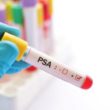Genetic PSA score may improve prostate cancer screening accuracy
Incorporating genetic factors that influence PSA levels into prostate cancer screening may help
reduce unnecessary invasive testing and improve the detection of aggressive disease.

“We know from previous research that PSA levels are highly heritable (30-40%)—so we know
that genetic factors play a role and this is an opportunity to leverage that genetic information
to improve a diagnostic test that isn’t perfect, but has a great deal of promise,” said the study’s
lead author Linda Kachuri from the University of California San Francisco.
Kachuri carried out the largest ever genome-wide association study of PSA levels in men
without prostate cancer (n=95,768). The analysis identified 128 variants that were significantly
associated with PSA levels, including 82 that had not previously been identified.
With this information, the researchers created a PSA genetic score that calculates the sum of
genotypes across the 128 PSA-associated variants weighted by their individual effects on PSA
levels. This score can be used to create a personalized adjustment factor that modified PSA
values either upward or downward based on each person’s genetic predisposition.
Kachuri told Inside Precision Medicine that while the genetic risk score requires genetic data for
all patients “this could be achieved using genotyping, which is less costly than whole genome
sequencing.”
The investigators validated the PSA polygenic score in two cancer prevention trials involving
almost 28,000 participants and found that it explained 8.3%-8.7% of variation in baseline PSA
levels.
Preliminary data also showed that genetically adjusted PSA more accurately predicted
aggressive prostate cancer better than PSA alone.
“This is the ultimate goal of this line of research—improving the accuracy of PSA screening so
that it can be implemented as a systematic screening for all men.” Kachuri hopes “that genetic information can reduce the ambiguity in PSA screening and empower men and their clinicians
with more accurate information for making healthcare decisions.”
American Association for Cancer Research: Kachuri L, et al “Genetic determinants of PSA levels improve prostate cancer screening” AACR 2022; Abstract 1441.



















